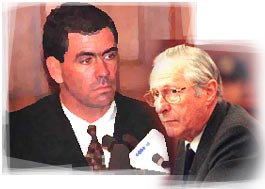 Home > Cricket > Diary archives
Home > Cricket > Diary archivesFebruary 9, 2001

Politics puts brakes on King Commission
Paul MartinIn general I subscribe the “mess-up” rather than the “conspiracy” theory of political life. But with the latest twists in the King Commission inquiring into cricket corruption, I am inclined to detect more of the latter than the former.
The story of the Commission so far: It takes several weeks to assemble, then is in a tearing hurry to have Hansie Cronje in the witness box – three High Court judges had to suggest that ex-Judge President Edwin King could be committing contempt of court if he insisted on calling up Cronje without the hearing being broadcast.
Then, a remarkable change. No hearings. The supposed reason: the players were going to tour Sri Lanka – even though the significant ones had already given evidence. Then, the interim report comes out weeks later than President Mbeki had originally demanded. Then, a series of delays supposedly so the Commission can gather evidence in India. Then, it gets too close to the Christmas holidays. Then, Cronje secures a court order to delay proceedings further as his legal team were not pre- warned as to when the Commission would resume.
And now the most bizarre convolution of all: King announces this week that it would be “intolerable” to resume at all. That’s supposedly because a question has been raised over whether any judge can now chair a Commission. All legal experts have stated that there is absolutely no basis for this question. Yes, Hansie Cronje’s lawyers have eagerly raised the matter – wondering if a Constitutional court ruling over another judge heading a commission may also be applicable to Edwin King.
But that was in respect of a commission investigating corruption within the government (over a massive arms deal). The King Commission relates to the activities of cricket-players, cricket administrators and private citizens (e.g. bookmakers). It is hardly, as they say in the law, on all fours. And in any case, there are other key differences. Judge Heath is still a serving member of the Judiciary; “Judge” King is not a judge any more – he retired just before he became Commissioner, aged 70. And in any case the government was given one whole year to make the necessary changes – so surely Judge King will, at the very least, have another year to finish his inquiry – which even he should find sufficient.
Yet Judge King's office issued this statement: "Regardless of whether there is any merit in this view, the perception will have been created in the public mind that the proceedings of the Commission under the chairmanship of Judge King may be unlawful. This is an intolerable situation and it would be inappropriate for Judge King to continue the Commission until clarity has been obtained.
"The sitting scheduled for 19 February 2001 will accordingly not take place. The public will be kept informed of further developments. Any inconvenience caused is regretted." Just why has the judge appeared so eager to comply with the ludicrous quasi- demands of one party in the corruption saga? The answer may lie in a briefing given by a very senior South African cricket official last weekend. It was off-the-record, so I can mention no names.
The official said the Commission would “peter out”. He said the police had already told the cricket chiefs there will be no more revelations. The focus, he suggested, should be on corruption in the Sub-continent, especially India. And he even claimed (not without foundation) that the patchy pay structure in Indian cricket, even for the stars, opens the way for temptation. Note that this cricket administrator made these comments even before the King Commission made its surprise delaying statement. Is it a form of political go-slow?
There had been strong speculation that both Dr Ali Bacher himself would have faced some very significant new questions to answer and evidence to face. How much did the United Cricket Board members know, and why did they do so little? And so on.
There is also a widespread view that Cronje knows a lot more than he has so far revealed, and might have had a few more bomb-shells to uncover. Remember, as reported by rediff.com, Cronje’s own spiritual guide, the Rev. Ray McCauley, said Cronje had not lied to the Commission but he had not been asked all the right questions. There may be many people who don’t want to hear what Cronje may say if asked the “right” questions.
Here is another interpretation of events that more closely matches the “mess-up” theory I usually favour. The degree of incompetence displayed by Judge King could well partially explain things.
Remember, he managed to ban radio broadcasting of his hearings then fought a failed court battle. He also failed to notify Cronje’s lawyers about his re-start dates, so losing another court action, and incurring debts of around US dollars 50,000 for the tax-payer to pick up. And now it could be argued King just took a naively over-cautious view on whether his own right to serve as Commissioner could be challenged.
My own view is that Judge King is not quite so ignorant of the law as that. He knows he has the right to run a commission. It’s just that people close to him want things to “peter out”. That’s cricket, old boy.
©1996 to 2001 rediff.com India Limited. All Rights Reserved.